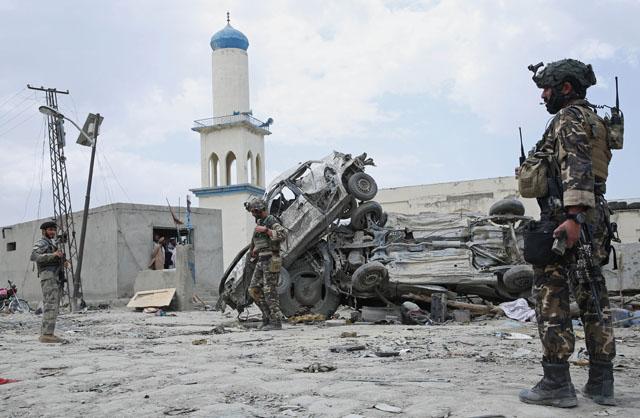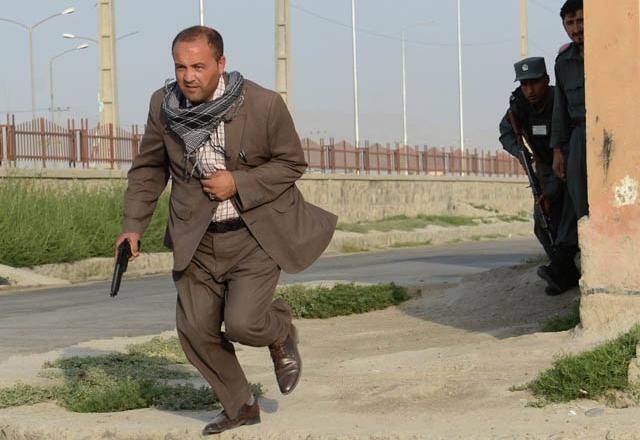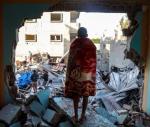You are here
Afghan future hangs on fragile vote deal
By AFP - Jul 16,2014 - Last updated at Jul 16,2014

KABUL — Every single vote cast in Afghanistan’s run-off presidential election will be checked for signs of fraud in a painstaking process set to begin this week — and the stakes could not be higher.
Transported to Kabul under armed guard, these 8.1 million pieces of paper hold the key to which of the two men vying to replace President Hamid Karzai will lead Afghanistan into a new era as US-led troops withdraw.
The operation is set to get under way on Thursday after a historic deal last weekend between presidential candidates Ashraf Ghani and Abdullah Abdullah — whose rival victory claims, amid allegations of massive fraud, pushed the nation to the brink of disaster.
“There was a fear that this was getting out of control,” said James Cunningham, the US ambassador to Kabul.
Ghani was last week announced the winner of the June 14 vote according to preliminary results, with 56.4 per cent against Abdullah’s 43.5 per cent.
But Abdullah, accusing Ghani of massive ballot-stuffing, swiftly claimed he was the real victor — plunging Afghanistan’s first democratic transfer of power into crisis.
Rumours swirled that Abdullah’s supporters were planning to march on the presidential palace in Kabul, with some in his camp raising the prospect of forming a “parallel government”.
With the two rivals’ support largely split along ethnic lines, fears grew of a return to the brutal violence of the 1992-1996 civil war.
The United States, haunted by the recent turmoil in Iraq as well as the spectre of more bloodshed in Afghanistan, dispatched Secretary of State John Kerry to find a way out.
“The reason we intervened so rapidly was to urge people to stop even thinking about going down that road,” said Cunningham.
Under the deal forged by Kerry after two frantic days of talks, both candidates have agreed to accept the result of the vote audit, while the deal paves the way for a government of national unity, including a role for the losing side.
After weeks of fruitless diplomatic efforts, it was hailed as a triumph.
“Whatever we tried before Kerry came, there were red lines,” said one diplomatic source close to the negotiations.
But both candidates have realised the deal was “the only chance they have” to end the deadlock, the source added.
The logistics of the operation, set to last three weeks or more, are daunting.
Some 23,000 ballot boxes are being transported by the Afghan army and NATO forces to the capital, where they will be examined at 100 verification stations.
NATO’s International Security Assistance Force (ISAF) said it would play a “supporting role” in the process, providing air transport for less than 40 per cent of the votes.
The United Nations, which is overseeing the audit, hopes to post an international observer in each verification station, with most to be drawn from foreign embassies in Kabul.
Pandora’s box
The first technical details were being worked out on Wednesday, according to Ahmad Yusuf Nuristani, head of the Independent Election Commission (IEC).
The ballots will be scrutinised against a checklist, with IEC members — under the watch of the international observers — checking for patterns that could indicate voting fraud.
Officials will be looking for similarities in the way ballots have been filled in, for example. They will also be checking that the number of ballots matches the figure on the official results sheet.
Aside from the fraud checks, the historic deal between Ghani and Abdullah also opens the Pandora’s box of how the new national unity government should be structured, and made up.
Crucial details — including whether the government will be based on a parliamentary system, which could mean the delegation of some presidential powers — remain unclear, while the fact that the deal has been agreed but not signed by the rival candidates adds further uncertainty.
The candidates met Tuesday to discuss further details, with Ghani’s spokesman Hamidullah Farooqi saying both candidates had agreed to give posts in their government to members of the losing team.
Farooqi said if Ghani wins, they would convene a “loya jirga” or grand assembly of elders to create a new post for the losing side and work out how such a job would work.
The inauguration of the new president, which was due on August 2, has now been delayed to allow time for the audit.
But instability could surge again at any moment in a country where the Taliban remain a potent and deadly force 13 years after they were toppled from power.
On Tuesday a suicide bomber drove an explosive-laden truck into a busy market in Paktika in the country’s southeast, killing at least 42 people.
Related Articles
Afghanistan on Thursday began a massive audit of 8.1 million ballots cast in the run-off round of its controversial presidential vote, hours after a brazen Taliban raid on Kabul’s airport. The audit is aimed at reversing a destabilising political crisis that has threatened to widen the country’s ethnic fissures as foreign troops prepare to withdraw after more than a decade of war.
The United States warned on Tuesday it would withdraw financial and security support from Afghanistan if anyone tried to take power illegally, as supporters of a presidential candidate rallied in Kabul for a parallel government.
KANDAHAR, Afghanistan — Candidates in Afghanistan's presidential election pushed their messages for the last time on Wednesday as campaignin

















